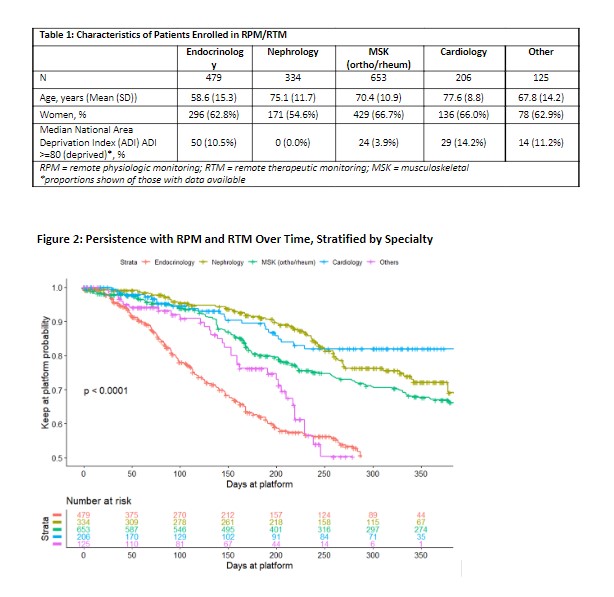Session Information
Session Type: Poster Session B
Session Time: 9:00AM-11:00AM
Background/Purpose: Remote Physiologic Monitoring (RPM) and Remote Therapeutic Monitoring (RTM) are new care delivery options by which patients can provide data to their provider via a biosensor device and/or smartphone app in an insurance reimbursable fashion. However, patients’ willingness and persistence to engage in RPM/RTM over time is unclear.
Methods: Using data from 9/2020 – 5/2023, we examined characteristics of patients who enrolled in a national RPM/RTM program as part of routine care, stratified by medical specialty. Time on the program began at the time patients were first enrolled in the program and contributed data and continued until they voluntarily withdrew from the program, were lost to follow up (i.e. became inactive) or were censored. Kaplan Meier curves described persistence over time, stratified by medical specialty, combining musculoskeletal (orthopedics and rheumatology) and Others (e.g. pulmonology, primary care) into a single group. Cox proportional hazards models evaluated the time to discontinuation by medical specialty, adjusting for age and sex.
Results: A total of 1797 patients were enrolled, with characteristics as described in table 1.Mean age was greater than 70 years for all cohorts except endocrinology. Persistence with RPM/RTM significantly differed by specialty (Figure). Approximately 80% of patients being monitored for musculoskeletal conditions were approximately 80% adherent at 6 months. Referent to patients being monitored for musculoskeletal conditions (e.g. rheumatology), persistence with RPM/RTM was worse for patients being monitored for endocrinology conditions (age-sex-adjusted hazard ratio for non-persistence=2.3, 95% CI 1.8-2.8) and was not different for other specialties.
Conclusion: Most patients with musculoskeletal or other chronic health conditions are persistent with digital health care delivery systems such as remote physiologic and remote therapeutic monitoring. Strategies to optimize patient engagement with such programs are important to maximize the health benefits of these new digital healthcare delivery mechanisms.
To cite this abstract in AMA style:
Curtis J, Sodhi S, Su Y, Laster S, Xie F, Liu Y, Patrick C. Will Patients Engage with Digital Technologies as Part of Routine Healthcare? [abstract]. Arthritis Rheumatol. 2023; 75 (suppl 9). https://acrabstracts.org/abstract/will-patients-engage-with-digital-technologies-as-part-of-routine-healthcare/. Accessed .« Back to ACR Convergence 2023
ACR Meeting Abstracts - https://acrabstracts.org/abstract/will-patients-engage-with-digital-technologies-as-part-of-routine-healthcare/

